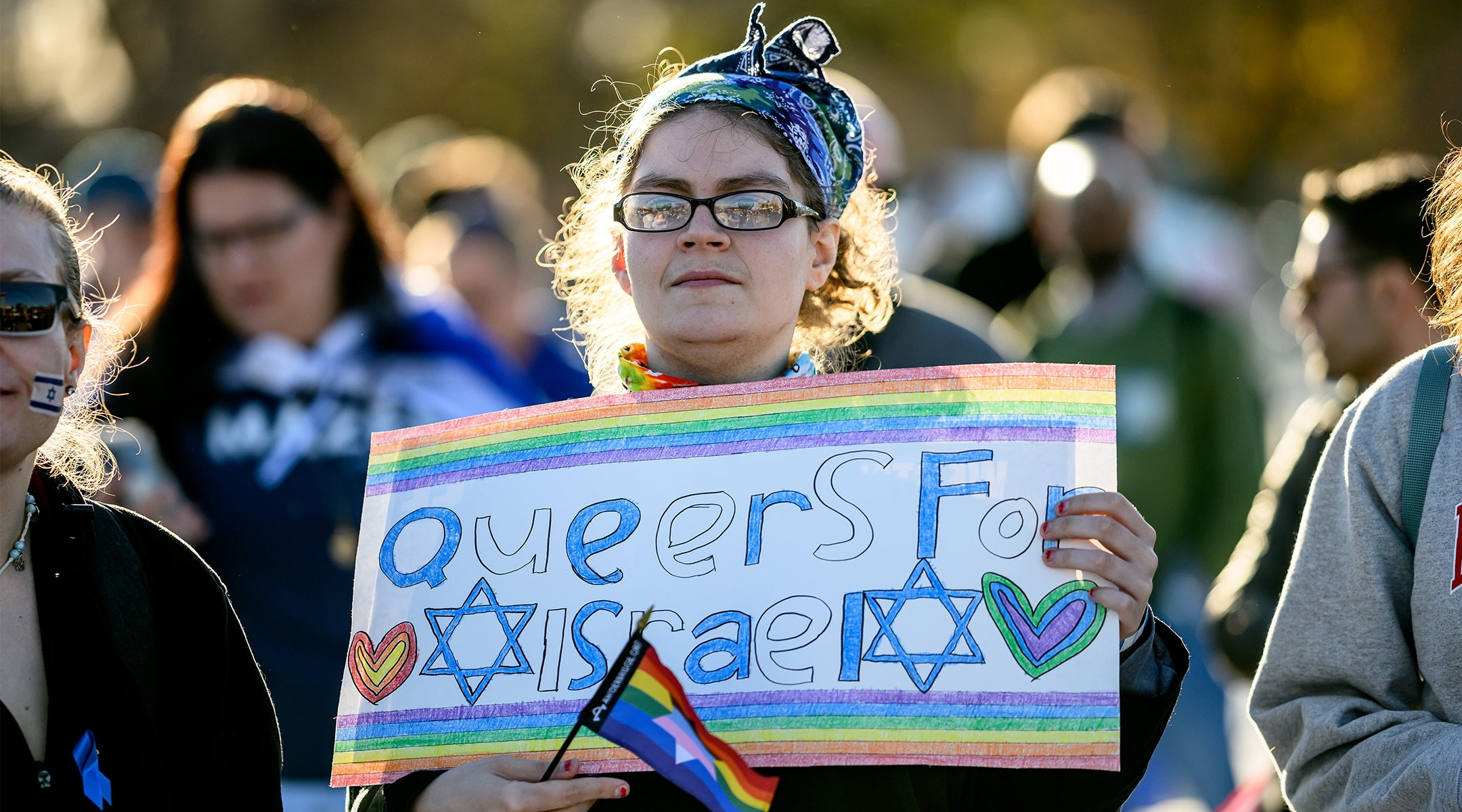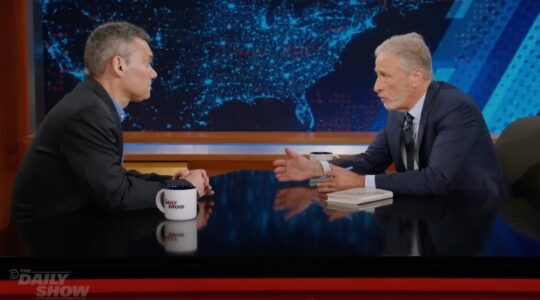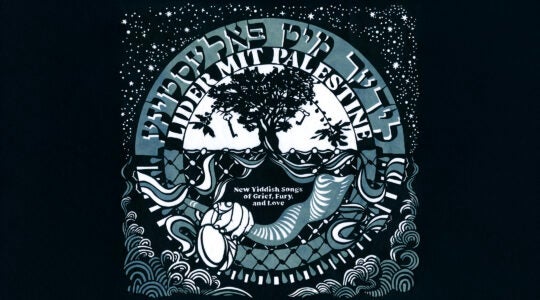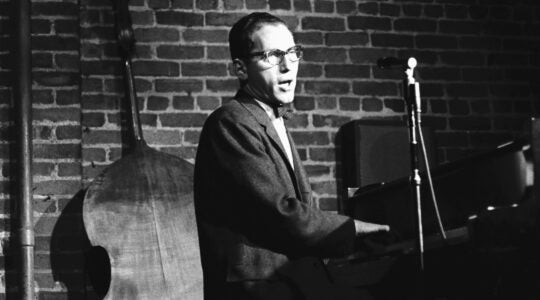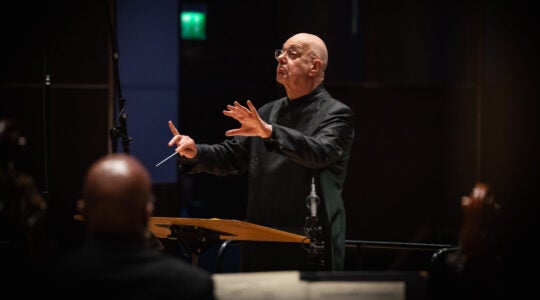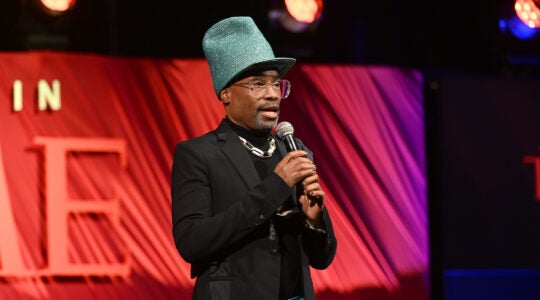This article was produced as part of JTA’s Teen Journalism Fellowship, a program that works with Jewish teens around the world to report on issues that affect their lives.
“How does it feel to be on the wrong side of history?” These were the words flung at a student wearing a Star of David necklace by a leader of one of Binghamton University’s LGBTQ+ clubs.
When the visibly shaken student found Myles Resnick, in the Hillel office, Resnick, a queer peer leader, empathized. Tensions were escalating on campus following the narrow passage of a boycott, divestment and sanctions resolution against Israel on campus last April. But the hurled comment stung Resnick because it came from a friend of his who led an LGBTQ+ organization Resnick was active in.
This exchange reflects the growing rift between LGBTQ+ activists and Jewish students, many of whom feel increasingly isolated by the strong pro-Palestinian stance within queer organizations. At Binghamton, support for BDS from LGBTQ+ groups, including the university’s Rainbow Pride Union, mirrors a broader national trend of queer groups aligning with the pro-Palestinian cause.
These groups include No Justice No Pride, ACT UP NYC, National Queer Asian Pacific Islander Alliance, and Black and Pink, allof which have taken public stances deeply critical of Israel and Zionism since the Hamas attacks of Oct. 7, 2023 and the subsequent war. Many queer Jewish teens who once looked to these groups for solidarity and support now feel marginalized by their positions. Disagreeing with the organizations’ statements, they say they feel ostracized from the broader LGBTQ+ community. For these already vulnerable teens, the shift has deepened their sense of isolation and alienation.
Sophia Barenholtz, a senior at a high school in Essex County, New Jersey, has found herself feeling increasingly unsafe and unwelcome in her own LGBTQ+ community. “I have definitely noticed the tendency for LGBTQ+ organizations to take an anti-Zionist, and often antisemitic, stance on the Israel-Hamas War,” she said. “It has made me feel unsafe and unwanted in my own community, and has me questioning the integrity and critical thinking skills of my LGBTQ peers.”
Barenholtz said that she finds it disappointing that a community that values open-mindedness and understanding won’t consider the voices of queer Jews asking for Israel to be given a chance.
“Instead of engaging in meaningful dialogue, some people have called me antisemitic slurs, sent me death threats, and wished for me to impose unspeakable harm upon myself,” Barenholtz said. “It’s especially unfortunate that these remarks have come from members of my school’s LGBTQ+ organizations and members of the LGBTQ+ community.” Barenholtz’s school district is currently under a federal investigation for an unspecified allegation of bias related to the disputes between Muslim and Jewish students
Meanwhile, accusations against Israel of “pinkwashing” highlight another wedge within the community. Israel, which advocates describe as a haven for LGBTQ+ people, decriminalized same sex relations in 1988 and passed many anti-discriminatory laws to protect LGBTQ+ individuals in the 1990s. Critics claim the country uses LGBTQ+ rights and promotes these positions to obscure its treatment of Palestinians. Israel’s defenders point to the harsh treatment of LGBTQ+ individuals in Gaza and neighboring regions, including Egypt and Lebanon. In 2016, a Hamas leader was tortured and executed after being accused of being gay, according to a report in the left-leaning Haaretz.
On Oct. 7, the one-year anniversary of the Hamas terrorist attack on Israel, the New York City-based Anti-Violence Project, an LGBTQ+ defense group, issued a statement accusing Israel of “genocide.” A Wider Bridge, which promotes ties between LGBTQ+ groups in America and Israel, called the statement inflammatory and unhelpful, and said it reflected a “callous indifference to the human suffering experienced” on Oct. 7 and after, “particularly by LGBTQ Jews in New York City.”
Shir Levenson, a Jewish LGBTQ+ high school junior from Long Island, said that pro-Palestinian stances from LGBTQ+ groups make her feel disconnected. “When these groups take such extreme positions, it makes me feel like I don’t belong,” she said. Levenson explained that she’s unfollowed influencers and celebrities, including Matt Bernstein and Reneé Rapp, because of what she calls their anti-Israel and pro-Palestinian narrative. “I thought they’d recognize the truth and support Israel, which is more accepting of LGBTQ people, rather than places where we’re persecuted,” she said. “Their extreme positions, like accusing Israel of genocide, don’t acknowledge the humanity on both sides.”
JTA reached out to ACT UP NYC for comment but received no response. The group’s website accuses Israel of genocide and states that “Israel bombs Queers,” while also criticizing GLAAD, a leading LGBTQ+ media monitoring group, for not taking a stance on the conflict. GLAAD, which has faced criticism for its partnership with the Antidefamation League, released a statement in October expressing sympathy for all those affected by the conflict and calling for an end to antisemitism and Islamophobia. Pro-Palestinian advocates boycotted GLAAD’s 2024 awards, an event that celebrates LGBTQ+ trailblazers.
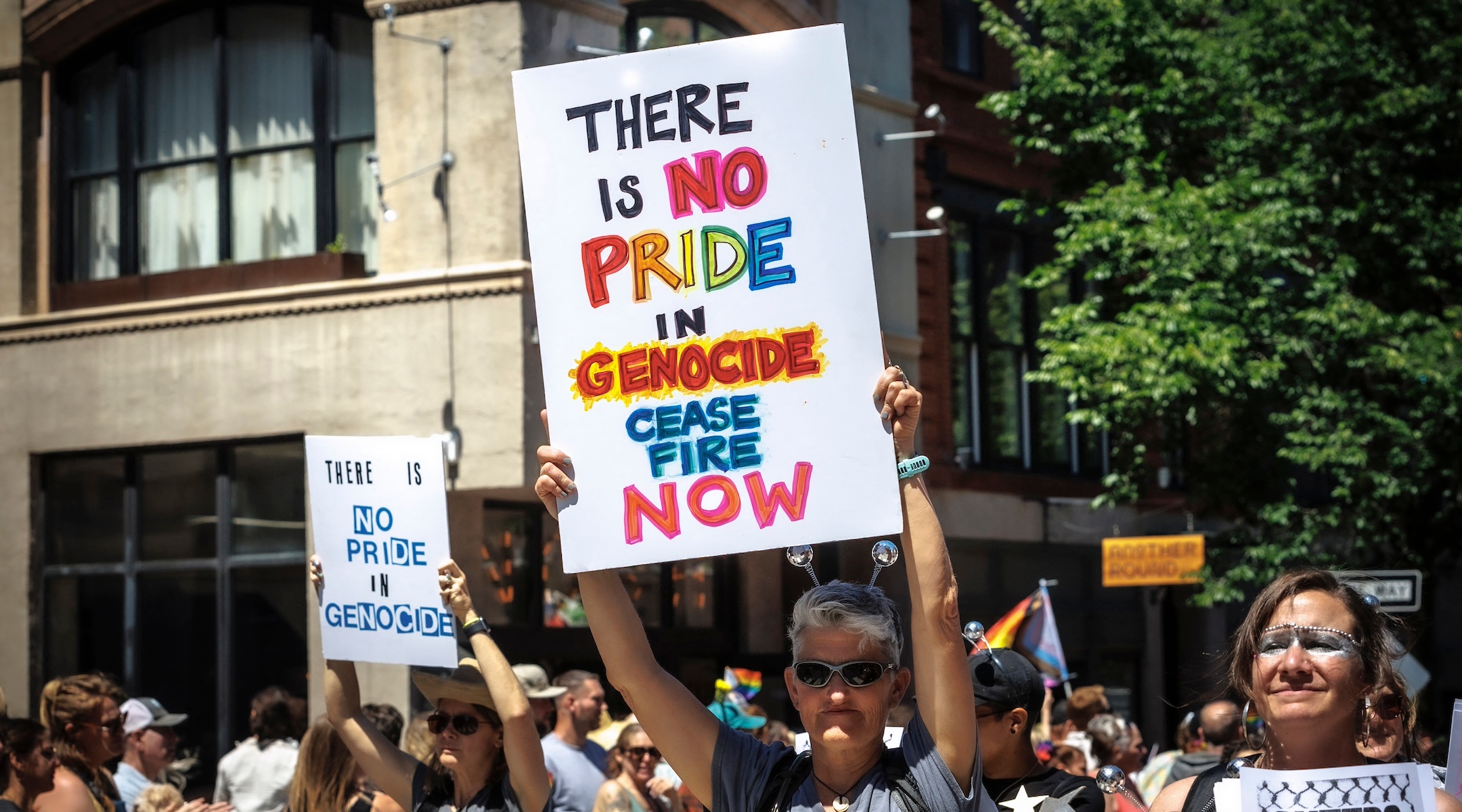
A marcher holds a sign accusing Israel of genocide in Gaza during the Pride parade in Portland, Maine, June 15, 2024. (David Himbert/Hans Lucas via AFP)
Some within the LGBTQ+ Jewish community do not feel this tension. Avi Chesler, from Huntington, New York, said he feels comfortable in LGBTQ+ affinity spaces. He blames the natural divisions that the issue causes, and laments “some of my Jewish community’s [inability] to acknowledge Palestinian suffering alongside Israeli suffering, despite the constant pain for all affected that so many members of the community feel.”
Jewish Voice for Peace, an anti-Zionist organization, links LGBTQ+ liberation with broader social justice goals, including justice for Palestinians. “At JVP, we understand that all people’s liberation is intertwined, and we work towards a world where everyone is safe and free,” media coordinator Liv Kunins-Berkowitz said. “Our commitment to LGBTQ+ rights is inextricably linked with ending genocide, occupation, apartheid, and militarism, which endangers queer people across the world. Queer liberation in Palestine is only possible in a free Palestine.”
Other Jewish groups remain committed to supporting LGBTQ+ youth while acknowledging the pain on both sides of the conflict. “LGBTQ+ Jewish youth deserve, always, to feel genuine belonging as their full, authentic selves,” Keshet, a Jewish LGBTQ+ organization, wrote in a statement to JTA.
“Especially since the attacks against Israel on October 7th and the ensuing war in Gaza — with ongoing loss and suffering for both Israelis and Palestinians, we have seen an increase in painful division and hate,” wrote Jamie Krass, Keshet’s director of youth programs. “In these times, it is particularly critical that queer Jewish youth have access to affirming community, without needing to leave any parts of their identities at the door.”
Amelia Mamlet, a queer, Jewish and openly Zionist high school senior from New Jersey, felt the growing tension firsthand. “I’ve noticed that a lot of LGBTQ+ organizations I once followed have taken pro-Palestinian or even anti-Israel stances. It makes me feel unseen,” she said. Mamlet described her discomfort watching liberal groups that she once supported adopt strong anti-Israel positions. “I’m more liberal myself, but when I see these organizations being anti-Israel, it feels like I can’t stand with them, even though I agree with so many of their other ideologies,” Mamlet said. “It leaves me feeling like there’s no place for someone like me.”
Mamlet said LGBTQ+ organizations should focus on supporting queer individuals rather than taking divisive political stances on international conflicts. “We’re already vulnerable. These spaces are supposed to protect us, not alienate us further.”
Mia Rubenstein, a sophomore at Tufts University, once considered the LGBTQ+ Center on her campus a safe space. “Before the conflict, the Q Center felt welcoming,” she said. As part of a pre-orientation LGBTQ+ advocacy group, Rubenstein found comfort there. “But after October 7, they publicly supported Palestine, and it made me feel really uncomfortable.” The center ran events with Students for Justice in Palestine, or SJP, and Rubenstein noticed the group following SJP on social media while showing no support for Jewish or pro-Israel groups.
“It felt like you had to be LGBTQ and pro-Palestine to be welcomed. You couldn’t just be LGBTQ without also subscribing to their political stance,” she said. This realization left her feeling disconnected from a community she had invested time in.
Resnick, the Binghamton student, felt a similar shift when LGBTQ organizations, such as the Rainbow Pride Union, a queer student club, endorsed a BDS resolution in April. Though Binghamton’s official LGBTQ+ center didn’t take an official position, its leadership expressed anti-Israel views and continued to run events with groups such as the Rainbow Pride Union.
“The president of the Rainbow Pride Union used to be a close friend, and now I’m literally blocked on Instagram,” he said. After voicing support for Israel and speaking out against the BDS resolution, Resnick faced backlash from his peers. “I released an article to share at the [BDS] hearing, and after that, I was slammed by people who were very involved in the queer community.”
“That was the moment [when] it all sort of clicked for me. This isn’t just something we’re tiptoeing around. This is something that’s really important to me, and it made me feel like I can’t be in that space if I disagree,” he said.
JTA has documented Jewish history in real-time for over a century. Keep our journalism strong by joining us in supporting independent, award-winning reporting.
